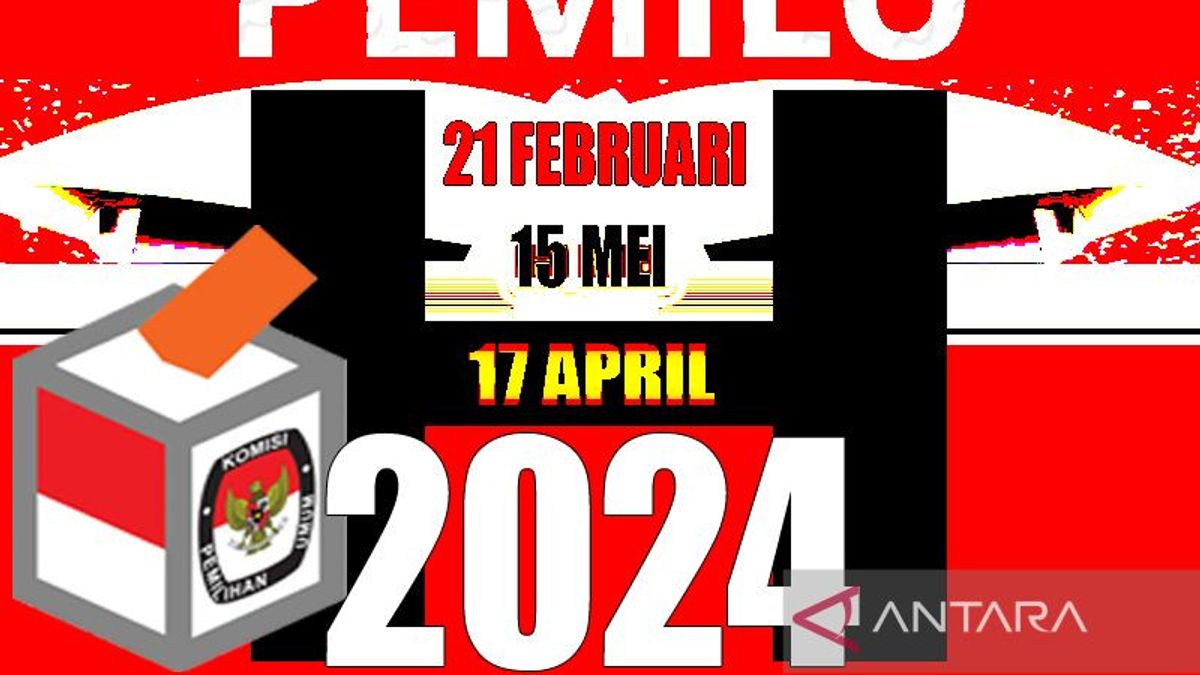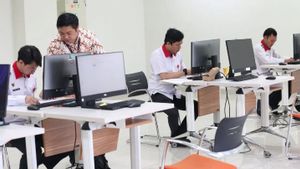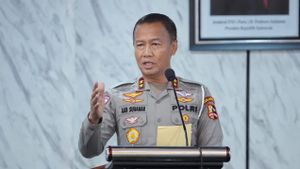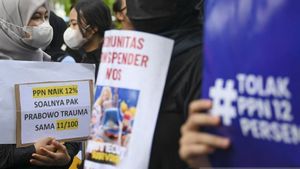JAKARTA - Ahead of the process of registering, verifying, and determining the political parties (Parpol) participating in the 2024 General Election on August 1-14, the public's desire for a simplification of the number of political parties in the 2024 General Election is quite large. They want the voting process to be simpler without having to see a lot of party logos on the voting paper.
"Don't have too many parties if you can, after all with multi-party, since the reform era the results have not been too significant to make this nation a better place," said Anto Kurniawan, a resident of DKI Jakarta who already has the right to vote.
However, this does not mean that we will return to the New Order era, which consisted of only three political parties. The 2019 election was participated by 14 national political parties and 4 local Aceh political parties.
"This is quite a lot. Actually, five parties is enough," he added.
Political observer from Al Azhar University Indonesia, Ujang Komarudin, agrees. He does not deny that the heterogeneous construction of Indonesian society has made the concept of multiparty a standard thing.
However, the current reality is that there are too many political parties and the results are inefficient. Often there is discontinuity between the parties.
“There are things that should have been decided quickly but have become debated. Of course, this happens because each political party has different interests," he told VOI, Monday (25/7).

So, he said, it may be necessary to re-apply the threshold rules for parties that can become contestants in the 2024 General Election.
"Only three games, I think it's suitable. But, don't perceive it like it was during the New Order era," said Ujang.
The results of the Kompas poll on Monday (25/7) stated the same thing. The public's desire to simplify the number of political parties in the 2024 General Election is quite large. The hope is that with a few contestants, it will be easier for the voters to understand the contents of the ballots.
The poll involved 508 respondents aged at least 17 years from 34 provinces. As many as 45.5 percent of respondents want fewer political parties in the 2024 election, 35.8 percent of respondents want more political parties in the 2024 election, then 16.3 percent of respondents want the number of political parties to be the same as the 2019 election.
Respondents who want to simplify the number of political parties, the majority are secondary education and higher education academics.
"The public attitude as illustrated by the results of this opinion poll gives a signal that there is a tendency for respondents to want to participate in elections easily, with not too many political parties," said Kompas Research and Development researcher Yohan Wahyu quoted from Kompas.com.
Indonesia has always been multi-partyIndonesia has implemented a multi-party system since the 1955 General Election which was attended by 29 political parties. Due to the political instability at that time, especially with the rebellion of the Indonesian Communist Party, the election rules were again changed.
There was a simplification of the number of parties to 10 political parties in the 1971 general election. Then, in 1974, the New Order government again simplified it by merging a number of political parties until only three parties remained: PPP, Golkar, and PDI. PPP is the result of the fusion of several political parties based on Islam (NU, Parmusi, PSII, and Perti). PDI is a merger of nationalist and non-Islamic religious parties (PNI, IPKI, Parkindo, Catholic Party). Meanwhile, Golkar is a political party formed by the New Order Government.
In the 1998 reform era, the rules changed again.
“There was political liberalization at that time, after the New Order collapsed. Freedom of expression is getting wider. So many people think that three parties are not enough to represent the opinions of this heterogeneous nation. There were 48 parties that participated in the 1999 general election,” said political observer from the University of Indonesia, Panji Anugerah Permana to VOI some time ago.
Seeing that there are too many contestants, the next election will apply an electoral threshold, only political parties with a minimum number of seats in the DPR can take part in the election. Parties that do not reach this number can join other parties or form a new party. Thus, the number of participants in the 2004 general election was reduced, only 24 political parties participated.

"In this election, the third amendment to the 1945 Constitution was carried out, one of which was related to the president and vice president being directly elected by the people. So, no longer through the MPR. This is also the result of an evaluation of the previous elections and the conditions that occurred at that time,” he said.
Unfortunately, continued Panji, although the President has been directly elected by the people, the government that has been formed is considered ineffective. This is because the executive and legislature are not harmonious in implementing various government programs.
“The era of Gus Dur and SBY is an example. Both of them did manage to become president. However, the votes of their supporting political parties lost in parliament. So, there are often conflicts between the executive and the legislature,” said Panji.
The 2009 election was conducted using the same method but with the adjustment of the electoral threshold to 2.5 percent. Followed by 38 parties. Then, in the 2014 election, the number of parties participating was reduced to only 12 parties.
"Start applying the 20 percent presidential threshold. Pairs of candidates are proposed by political parties or coalitions of political parties participating in the general election who meet the requirements for obtaining seats of at least 20 percent of the total seats in the DPR or obtaining 25 percent of the nationally valid votes in the previous election for DPR members.
Not yet Effective and StablePanji does not deny that the multi-party presidential system implemented by Indonesia has not succeeded in creating an effective, efficient and stable government.
In a presidential system, parliamentary support for the president is very influential in the process of making laws and implementing government policies and programs. The greater the parliament's support for the president, the more effective the implementation of public policies by the government will be. Vice versa.
See parliamentary system. Political party coalitions are more disciplined. There are strict sanctions if there is a violation or suddenly leave the coalition. Sanctions include being expelled from parliament and unable to participate in the next general election.

"In Indonesia it is not like that. An example of PAN suddenly withdrawing its support for SBY in the middle of the road. Political parties that are members of coalitions tend to take advantage of the government. If the policies or programs taken by the government are not popular, political parties tend to oppose them," said Panji.
“The coalition of political parties in a parliamentary system is built after the election. Meanwhile, the coalition of political parties in a presidential system is built before the general election. As a result, during the nomination, the political parties supported it. However, when elected, the political parties even withdrew their support. For example, because of not being in the cabinet, and other things," said Panji.
The current situation is not much different. The initial goal is to change the political dynamics so that minority government does not happen again, disharmony between the executive and the legislature. However, what is currently happening, the relationship between the executive and the legislature is too harmonious.
"So, there are no checks and balances, no supervision," said Panji.
The Fat Coalition will be ineffectiveIn his article entitled 'Multi-party System, Presidential and Government Effectiveness Issues' uploaded to the official account of the Ministry of Law and Human Rights, Researcher from the Center for Electoral Reform (CETRO), Partono provides solutions to create an effective and stable government.
Among other things by simplifying the number of political parties. The large number of political parties participating in the general election has made the coalition built to nominate the president and vice president too fat. As a result, the coalition does not work effectively because it has to consider many interests.
Ideally, the elected president comes from a coalition that has at least 50 percent of parliamentary support from the number of seats in the DPR and the number of parties participating in the coalition is not large, just two or three parties.
“Reducing the number of parties, coupled with a disciplined and binding party coalition, is the most feasible solution in the Indonesian context. The mechanism can be through restructuring as was done by President Soeharto in 1974," said Partono.

Then, increase the threshold percentage. Political parties that are not able to reach the threshold that has been set are not allowed to send their representatives in parliament. Percentages vary in different countries. In Germany the threshold is 5 percent, while in Turkey it is 10 percent. With a threshold of 10 percent, Turkey only has 3 or 4 political parties that have representatives in parliament.
Reducing the allocation of seats in each electoral district can also be done as a process of selecting political parties that truly receive public support. The smaller the allocation of seats in each electoral district, the smaller the party's chances of getting seats. Only the big parties have the chance to get seats. Meanwhile, small and medium parties will lose the opportunity to win the competition.
“Political parties that do not get significant votes are naturally encouraged to form coalitions with other parties or will die because they do not get votes and seats in parliament,” Partono wrote.
The English, Chinese, Japanese, Arabic, and French versions are automatically generated by the AI. So there may still be inaccuracies in translating, please always see Indonesian as our main language. (system supported by DigitalSiber.id)









